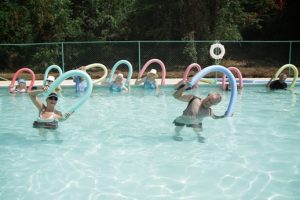 As we age, a lot of things can get harder. It might take longer to recover from an illness, or climb up a hill. Mobility and memory might not be what they used to be. As our bodies slow down, it can seem like we should slow down the pace of our lives and our level of activity to match. After all, even the least bit of physical exertion can be uncomfortable and frustrating. But that’s also exactly why it’s so crucial to maintain regular physical activity throughout your senior years.
As we age, a lot of things can get harder. It might take longer to recover from an illness, or climb up a hill. Mobility and memory might not be what they used to be. As our bodies slow down, it can seem like we should slow down the pace of our lives and our level of activity to match. After all, even the least bit of physical exertion can be uncomfortable and frustrating. But that’s also exactly why it’s so crucial to maintain regular physical activity throughout your senior years.
Regular exercise, rather than taking it easy, directly impacts how quickly you age. The qualities we associate with aging’s growing frailer or less able to manage daily tasks can be reduced or slowed by increasing physical activity. If it’s harder to carry the groceries in, the solution isn’t to avoid groceries entirely, but to slowly, carefully build up muscle strength and dexterity until it ceases to be such a difficult task. If walking long distances is difficult, building up stamina with light cardio will do you more good than becoming sedentary.
Exercise can also positively impact mental functions like memory, as well as decrease negative conditions like depression and anxiety that can limit seniors from leading full, rich lives. In other words, exercise is the key to staying youthful and maintaining your independence. For those looking into assisted living or memory care, it’s great news that something as simple as regular physical activity can have such a huge affect on quality of life. Even those in independent living or who have not yet joined a retirement community or moved into a residential care home can better maintain their present level of mental and physical ability by making fitness a priority.
Exercise doesn’t have to be strenuous. Many people shy away from any kind of physical exertion because they are afraid of pushing themselves too far or getting injured. But there are plenty of ways to be more active that don’t cross the line between “feeling the burn”.

